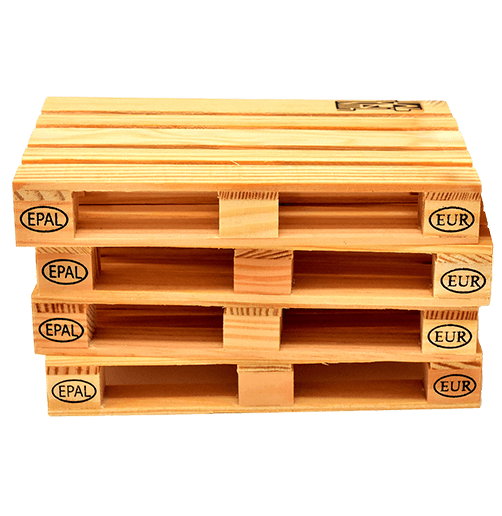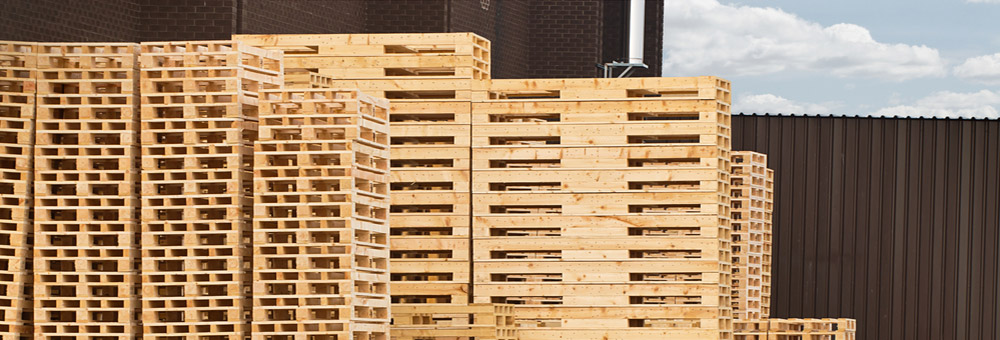
Your full service pallet suppliers!
Direct Supply, Inc. is dedicated to being your full service pallet suppliers! We are conveniently located in South Elgin, Illinois and serve businesses locally and all around the country, big or small!
We value all relationships and excel at customizing programs to fit your needs!
Let’s start “supplying your demands” and exceeding your expectations. Call today to let us show you why our reputation is our greatest asset!
Pallet Products
Wood Pallets: New, Reconditioned, Custom, Heat Treated & More
- Plastic Pallets: New, Used, Custom & More
Wholesale Lumber
- Combo Pallets
Top Frames
New Pallets
- Styrofoam Pallets

The Versatility and Practicality of Wood Pallets
As a reliable local source of pallets, Direct Supply specializes in providing a wide range of wood pallet options, including new, used, reconditioned, custom, Euro/EPAL, block, and heat-treated pallets. We understand the diverse needs of businesses, and our pallet pool comprises various standard footprints and construction styles. In addition, we offer services such as cleaning, refurbishing, and heat treatment to optimize the lifespan of your existing wood pallet inventory. Lets take a look at the advantages and disadvantages of wood pallets.
Advantages of Wood Pallets:
- Cost-Effectiveness and Durability: Wood pallets strike a balance between affordability and durability. They are a more cost-effective option for simple transport and warehousing needs compared to plastic or steel pallets. Wood pallets offer a reliable strength-to-cost ratio and are relatively simple to maintain, making them a practical choice for businesses.
- Reusability and Recyclability: Wood pallets are widely used and recognized, making them highly compatible for exchange between businesses and pallet suppliers. Their reusability and recyclability contribute to a sustainable supply chain, reducing environmental impact and promoting resource efficiency.
Disadvantages of Wood Pallets:
- Heat Treatment Requirement: To prevent insect infestations and comply with international regulations, wood pallets often require heat treatment. While this additional step adds to the pallet processing, it ensures the integrity and safety of your shipments.
- Susceptibility to Contamination and Moisture: Wood pallets are susceptible to fungal and bacterial contamination, as well as moisture absorption. Consequently, certain industries that demand strict hygiene standards may find wood pallets unsuitable for their specific applications.
- Weight and Stackability Limitations: Compared to plastic pallets, wood pallets tend to be heavier, which can impact handling and transportation costs. Additionally, they may not stack as efficiently for storage purposes, requiring careful consideration of space utilization.
- Maintenance and Sanitation Challenges: Cleaning and sanitizing wood pallets can be more challenging compared to plastic or steel alternatives. The porous nature of wood makes it harder to remove contaminants, which may be a concern for industries with stringent hygiene requirements.
At Direct Supply, we understand the importance of finding the right pallet solution for your business. With our diverse selection of wood pallets and value-added services, we aim to meet your unique requirements while providing reliable, cost-effective solutions.
Contact us today to explore our comprehensive range of wood pallet options, including customization possibilities.
Yes, you can sell wooden pallets to Direct Supply. We maintain a large pallet pool and one of the best sources of pallets is you! The vast majority of wood pallets can and should be reused so sell them to us so we can get them back out there.
Yes, Direct Supply recycles wood pallets. What can’t be reused or refurbished gets broken down and turned into new pallets, combination pallets, or it gets shredded and the metal pieces get removed using large and powerful magnets. The wood material then gets used in a variety of ways such as animal bedding, garden mulch, compost, wood chips for playgrounds or fuel for various industrial uses.

Direct Supply: Your Trusted Source for New and Used Plastic Pallets
At Direct Supply, we take pride in being your local supplier of top-quality plastic pallets. Whether you’re in need of new, used, heavy-duty, or stackable pallets, we have a diverse range of options available in our extensive pallet pool. What sets us apart is our commitment to sustainability, as many of our pallets are crafted from recycled materials.
Advantages of Plastic Pallets over Wood
- Enhanced Cleanliness and Sanitization: Plastic pallets outshine their wooden counterparts in terms of cleanliness and hygiene. They are easier to clean and sanitize, offering resistance to odors, contaminants, and both chemical and biological hazards. With plastic pallets, you can ensure a safer and more sanitary environment for your goods.
- Superior Durability and Extended Lifespan: When it comes to durability, plastic pallets excel. They are designed to withstand the rigors of heavy loads and frequent handling, offering a longer lifespan compared to wood pallets. Additionally, plastic pallets are fire retardant, reducing the risk of fire hazards in your storage areas.
- Lightweight and Stackable: Plastic pallets are significantly lighter than their wooden counterparts. This not only makes them easier to handle and transport but also helps reduce shipping costs. Moreover, many plastic pallets are stackable, optimizing storage space and maximizing efficiency in your warehouse.
- Compliance with International Shipping Standards: Plastic pallets have an advantage when it comes to international shipping inspections. They meet the requirements for biosafety and sanitation, ensuring smooth clearance through customs. By using plastic pallets, you can streamline your global supply chain operations.
Disadvantages of Plastic Pallets compared to Wood
- Load Capacity Limitations: While plastic pallets offer excellent strength and durability, it’s important to consider their load capacity limitations. Prolonged use under heavy loads can lead to potential collapse or deformation. Therefore, it’s essential to assess your specific load requirements and choose the appropriate pallets accordingly.
- Higher Initial Cost and Repair Challenges: Plastic pallets may come with a higher upfront cost compared to wood pallets. However, it’s important to consider the long-term benefits and cost savings they offer through extended lifespan and reduced maintenance. Repairing plastic pallets can be more challenging than wood pallets, but their durability often mitigates the need for frequent repairs.
At Direct Supply, as one of the leading pallet suppliers, we are dedicated to providing you with the highest quality plastic pallets that meet your specific needs. With our wide selection and commitment to sustainability, we strive to be your trusted partner in optimizing your pallet solutions.
Contact us today to explore our comprehensive range of plastic pallet options.
The cost of materials to make pallets out of plastic vs wood is higher due to short supply and higher demand. The upside is that plastic pallets tend to be more durable, lighter, and easier to clean, all of which leads to a longer lifespan for your pallet.
The answer to that lies in what your particular needs and uses are as well as how much you are looking to spend per pallet. Another consideration is stacking space and both the weight of the pallet itself and the weight capacity of the pallet. Sanitation issues play a key role in determining which type of pallet is right for you as well. Plastic pallets are far easier to sanitize and are not as susceptible to chemical or biological contamination.

Specialty Pallets: Tailored Solutions for Your Unique Needs
At Direct Supply, we understand that sometimes your pallet requirements go beyond the standard options. That’s why we offer a wide range of specialty pallets to meet your specific needs for shipping or warehousing. Whether you’re looking for custom pallets, combo pallets, corrugated cardboard pallets, styrofoam pallets, or pallet top frames, we have the expertise and inventory to provide the ideal solution.
Combo Pallets: A Cost-Effective and Eco-Friendly Balance Combo pallets offer a smart balance between cost effectiveness and environmental sustainability. By utilizing both new and reclaimed pallet parts, we create reconditioned pallets that minimize waste while still providing a reliable and sturdy platform for your shipments. These pallets are an excellent choice when you need a budget-friendly solution without compromising on quality.
Corrugated Cardboard Pallets: Lightweight and Surprisingly Strong If weight and affordability are your concerns, corrugated cardboard pallets provide a lightweight and cost-effective option. Despite their lightness, these pallets can carry a surprising amount of weight, making them suitable for various shipping and warehousing needs. Their lightweight nature also helps reduce shipping costs and allows for easy handling.
Styrofoam Pallets: Exceptional Strength with Minimal Weight Styrofoam pallets have gained popularity due to their remarkable strength-to-weight ratio. Weighing less than 10 lbs, these pallets offer outstanding carry capacity, making them an ideal choice for applications where weight is a concern. Additionally, their lightweight nature simplifies handling, reduces transportation costs, and makes them suitable for sanitization, catering to a wide range of industries.
Pallet Top Frames: Streamlining Unitization and Security Pallet top frames, typically made from laminated paperboard, are designed to enhance the unitization and security of your pallet loads. Placed on top of the load, these preformed frames facilitate the creation of a secure unit by providing stability and preventing shifting during transport. This simplifies the application of stretch wrap or strapping, ensuring your shipments reach their destination intact.
As one of the Midwest’s leading pallet suppliers, we are committed to providing tailored solutions for your specialty pallet needs. Our extensive inventory and industry expertise enable us to offer cost-effective, eco-friendly, and efficient pallet options that align with your specific requirements.
Contact us today to explore our range of specialty pallets and experience the Direct Supply difference in meeting your unique pallet needs.
Standard pallets can get the job done in many cases, that’s why they are standards, but sometimes you do need a custom pallet. If a load is especially heavy, uniquely shaped or requires special loading and moving equipment, you should look at getting a custom designed and manufactured pallet or group of pallets.
Corrugated pallets are a type of engineered paper pallet that can be hygienically manufactured and are suitable for clean room environments and suitable for medical, pharmaceutical and dry food industries.
Rather surprisingly, cardboard pallets can hold more weight than wood pallets. They can support up to 10,000 pounds.

From Heat Treating to Custom Designs
At Direct Supply, we understand that your pallet requirements extend beyond the physical pallets themselves. That’s why we provide comprehensive services to support your pallet management needs, including pallet heat treating, pallet recycling and buyback programs, and the ability to digitally design custom pallets using advanced software.
Heat Treating: Protecting Your Pallet Inventory, Ensuring Compliance Heat treating wood pallets is a vital step in safeguarding your pallet inventory from damage and contamination by insects or mold. It is particularly crucial for pallets being shipped internationally. In addition to meeting ISPM 15 standards, heat-treated pallets have the added benefit of reduced weight, as moisture is removed during the treatment process. Each heat-treated pallet receives a stamp as proof of compliance, ensuring hassle-free international shipping while maintaining the integrity of your products.
Pallet Recycling and Buyback Programs: Environmental Sustainability, Economic Benefits Our pallet recycling and buyback programs offer a win-win solution for both the environment and your budget. Instead of discarding your unwanted pallets, we provide options for reconditioning or reusing them if they are in good condition. By extending the lifespan of pallets through refurbishment, we minimize waste and promote sustainability. Pallets beyond repair can be recycled through shredding, with metals being efficiently removed using magnets. Embracing these programs not only contributes to a greener supply chain but also provides potential cost savings for your business.
Digital Pallet Design Software: Tailored Solutions for Unique Needs When standard pallets don’t quite meet your requirements, our advanced Pallet Design Software enables us to create custom pallets perfectly suited to your unique needs. Whether it’s accommodating a specific product, optimizing shipping methods, addressing storage constraints, or fulfilling your personal preferences, our software ensures that the designed pallets are not only tailored to your specifications but also fully functional. We understand that sometimes you need a pallet design that goes beyond the ordinary, and as trusted pallet suppliers, we are here to provide you with the ideal solution.
At Direct Supply, we go beyond supplying pallets to offer a comprehensive range of services that enhance your pallet management experience. From heat treating and recycling to custom design capabilities, we are committed to meeting your specific needs while promoting sustainability, compliance, and cost-efficiency.
Contact us today to explore how our pallet services can benefit your business and experience the Direct Supply difference in optimizing your pallet operations.
We buy wood pallets! Direct Supply has a pallet hoarding problem. What can we say, we like pallets, we want your pallets, we will pay you for your pallets.
The pallets that are going to be worth money are the ones that are going to be worth reusing. Pallet condition and commonality of size as well as what material type are all contributing factors to the value of your pallets. Pallets in the best condition that can be immediately reused and resold as is will be the most valuable. Pallets that can be repaired or used to repair other pallets will also have some value. Pallets too damaged to be salvaged will have no value and will be considered scrap to be recycled.
They are dismantled and the wood is used to make other pallets, shredded to make mulch or animal bedding, wood chips, compost, or fuel for burning. The metal nails and staples are removed using large and powerful magnets.
We also provide a range of pallet services
On Site Dropped Trailer Programs
Digital Pallet Design
Heat Treating for ISPM-15 Standards
CHEP Asset Recovery
Offering A Variety of Pallet Designs

Stringer Pallet
Stringer pallets feature vertical boards known as stringers that run parallel to the sides of the pallet. Discover the benefits of stringer pallets, their load capacity, and how they facilitate efficient handling and storage.
 Stringer pallets are widely used and known for their simplicity, strength, and cost-effectiveness. Here are some key details:
Stringer pallets are widely used and known for their simplicity, strength, and cost-effectiveness. Here are some key details:
- What are Stringer Pallets?
- Stringer pallets are pallets with vertical boards called stringers that run parallel to the sides. They typically have two or three stringers, providing structural support and load-bearing capacity.
- Advantages of Stringer Pallets:
- Versatility: Stringer pallets are compatible with various handling equipment, such as forklifts and pallet jacks, making them suitable for a wide range of industries and applications.
- Cost-effective: Stringer pallets are often more economical compared to other pallet types, making them an attractive choice for businesses looking for budget-friendly solutions.
- Strength and Durability: The stringers contribute to the overall strength and stability of the pallet, allowing them to withstand heavy loads and rough handling conditions.
- What is the load capacity of stringer pallets?
- The load capacity of stringer pallets can vary based on factors such as the material used, construction quality, and design. It is crucial to adhere to load capacity guidelines provided by the pallet manufacturer or industry standards.
- Can stringer pallets be repaired if damaged?
- Yes, depending on the extent of damage, stringer pallets can often be repaired by replacing the damaged stringers or deck boards.
- What is the difference between a Stringer Pallet and a Block Pallet?
- Stringer pallets have vertical stringers, primarily distribute load through them, feature boards running perpendicular to the stringers on the bottom deck, and are often more cost-effective, whereas block pallets incorporate solid blocks in addition to stringers, evenly distribute weight through both blocks and stringers, typically have full-perimeter boards on the bottom deck, and may be relatively more expensive due to their construction complexity.The below list offers a complete breakdown of the differences between the two:
- Stringer Pallets:
- Design: Stringer pallets have vertical boards called stringers running parallel to the sides, typically with two or three stringers.
- Load Distribution: Stringer pallets transfer the load primarily through the stringers, which distribute weight along the edges of the pallet.
- Bottom Deck Configuration: Stringer pallets usually have boards running perpendicular to the stringers, forming the bottom deck.
- Cost: Stringer pallets are often more cost-effective compared to block pallets due to their simpler construction.
- Block Pallets:
- Design: Block pallets incorporate solid wooden or engineered blocks at the corners, in addition to stringers. This design provides extra stability and load-bearing capacity.
- Load Distribution: Block pallets distribute weight evenly through the blocks and stringers, allowing for more balanced load distribution across the entire pallet surface.
- Bottom Deck Configuration: Block pallets commonly feature full-perimeter boards on the bottom deck, providing support and stability.
- Cost: Block pallets may be relatively more expensive than stringer pallets due to the additional material and construction complexity.
- Applications:
- Stringer pallets find extensive use in industries such as warehousing, distribution, manufacturing, retail, and transportation. They are suitable for a wide range of products, including packaged goods, consumer goods, industrial equipment, and more.
By utilizing stringer pallets, you benefit from their versatility, cost-effectiveness, and strength. Their widespread use across various industries showcases their reliability and compatibility with standard handling equipment. As trusted pallet suppliers, we offer a range of durable stringer pallets that meet your specific needs and provide the performance you can rely on.

Block Pallet
Block pallets incorporate solid wooden or engineered blocks at the corners, providing stability and load-bearing capabilities. Learn more about the advantages of block pallets and how they enhance your supply chain operations.

- Design and Construction: Block pallets feature solid blocks at each corner in addition to stringers. The blocks contribute to the structural integrity, strength, and load-bearing capacity of the pallet.
- Load Distribution: Block pallets distribute weight evenly through the combination of blocks and stringers, ensuring balanced load distribution and increased stability.
- Bottom Deck Configuration: Block pallets commonly have full-perimeter boards on the bottom deck, providing additional support, strength, and stability.
- Versatility: Block pallets are suitable for a wide range of applications and industries, including manufacturing, warehousing, retail, and transportation, due to their durability and load-bearing capabilities.
- Cost: Block pallets may be relatively more expensive compared to stringer pallets due to the additional material and construction complexity involved in their manufacturing.
- Can block pallets be used in automated systems?
- Yes, block pallets can be compatible with certain types of automated systems. It is important to consider the specific requirements and consult with system manufacturers or experts for compatibility.
- Are block pallets more durable than stringer pallets?
- Block pallets are generally considered more durable due to their robust construction and solid blocks, which enhance their strength and load-bearing capacity.
- What are the advantages of using block pallets for heavy loads?
- Block pallets excel in handling heavy loads due to their enhanced stability, load distribution, and structural strength, making them a reliable choice for heavy-duty applications.
By choosing block pallets from your pallet supplier, you benefit from their robust construction, even load distribution, versatility, and suitability for heavy loads. Their use spans various industries and applications, including manufacturing, warehousing, retail, and transportation. As reputable pallet suppliers serving the Chicagoland area, we provide a wide selection of block pallets that deliver the strength, durability, and performance you require.

Skid Pallet
Skid pallets, also known as single-deck pallets, offer a simplified design without stringers or blocks. Explore the characteristics of skid pallets, their applications, and when they are the ideal choice for your specific needs.
- Design: Skid pallets feature a single deck without any bottom deck boards. Instead, they have runners or blocks beneath the pallet, allowing forklifts, pallet jacks, or other handling equipment to lift and transport them from the bottom.
- Load Support: Skid pallets are designed to support heavy loads and are often used for bulk storage or transport of large, bulky items such as machinery, equipment, or construction materials.
- Accessibility: Skid pallets offer easy access from all four sides, making them ideal for situations where frequent loading or unloading from various angles is required.
- Space Efficiency: The absence of a bottom deck in skid pallets allows for space optimization during storage or shipping. These pallets can be stacked closely together, maximizing vertical space utilization.
- Material Options: Skid pallets can be made from various materials, including wood, plastic, or metal, depending on the specific application requirements.
- Durability: Skid pallets are built using reinforced structural components, such as thickened runners or blocks, reinforced joints, or additional bracing. These construction techniques enhance the overall strength and load-bearing capacity of the skid pallet, allowing it to withstand heavy loads and resist damage during handling and transportation.
- Applications: Skid pallets find application in industries such as construction, manufacturing, automotive, and storage facilities. They are commonly used for transporting heavy machinery, construction materials, and oversized goods.
By choosing a skid pallet, you can benefit from its heavy load capacity, easy accessibility, and space-saving design. These pallets are suitable for industries that deal with large, bulky items, and they provide a practical solution for efficient storage and transportation of heavy goods.

4 Way Pallet
A 4 way pallet is accessible from all four sides, providing flexibility in material handling and storage. Explore the benefits of these pallets, their compatibility with various equipment, and how they can be put to work in your warehouse or distribution center processes.
 A 4 way pallet is a versatile pallet design that allows forklifts and pallet jacks to access the pallet from all four sides. Here are some key details and features of 4-way pallets:
A 4 way pallet is a versatile pallet design that allows forklifts and pallet jacks to access the pallet from all four sides. Here are some key details and features of 4-way pallets:
- Design: A 4 way pallet is constructed with openings or notches on all four sides, enabling handling equipment to lift and move the pallet from any direction. This design facilitates easy maneuverability and efficient loading and unloading.
- Load Capacity: 4 way pallets are designed to handle substantial loads - ranging from a few hundred pounds to several tons - making them suitable for a wide range of industries and applications. They offer reliable support for goods during storage, transportation, and distribution.The exact weight capacity will depend on the specifications and quality of the pallet.
- Accessibility: Forklifts and pallet jacks can enter the pallet from any side, allowing for efficient material handling in warehouses, distribution centers, and manufacturing facilities.
- Compatibility: 4 way pallets are compatible with various types of material handling equipment, including standard forklifts, reach trucks, and pallet jacks. This streamlines the logistics process and enables seamless integration with existing equipment.
- Durability: A 4 way pallet is typically built using sturdy materials such as wood, plastic, or metal, ensuring durability and resilience. They are engineered to withstand heavy loads, rough handling, and rigorous conditions encountered during transportation and storage.
- Applications: 4 way pallets find widespread use across industries such as retail, food and beverage, pharmaceuticals, logistics, and manufacturing. They are suitable for various types of goods, including packaged products, bulk items, and containers.
- Industries where 4 Way Pallets Shine
- Logistics and Warehousing: The logistics and warehousing industry often favors 4 way pallets due to their ease of accessibility, efficient use of space, and compatibility with forklifts and pallet jacks. They facilitate streamlined material handling and enable efficient storage, retrieval, and transportation of goods.
- Retail and Distribution: Retailers and distributors commonly utilize 4 way pallets for their handling needs. The accessibility and compatibility of 4 way pallets make them ideal for efficiently moving and storing products in distribution centers, supermarkets, and retail stores.
- Manufacturing and Production: Manufacturers often use 4-way pallets to transport raw materials, components, and finished products within their facilities or between different production stages. The versatility and ease of handling provided by 4 way pallets contribute to efficient workflow and logistics within manufacturing environments.
- Food and Beverage: The food and beverage industry frequently employs 4 way pallets due to their suitability for transporting packaged goods, bulk products, and beverages. The compatibility with forklifts and pallet jacks makes it easier to handle palletized food and beverage products efficiently and safely.
By opting for a 4 way pallet, you gain the advantages of their versatile design, high load capacity, easy accessibility, and compatibility with different handling equipment. These pallets contribute to smoother logistics operations, efficient material handling, and reliable storage and transportation of goods. As trusted pallet suppliers, we offer a range of high-quality 4 way pallets that are designed for durability and optimized for efficient handling and storage.

2 Way Pallet
2 way pallet enables forklift entry and exit from two opposite sides. Discover the advantages of this design, including ease of loading and unloading, compatibility with specific handling equipment, and its impact on your operational efficiency.

2-way pallets are a widely used pallet design that allows forklifts and pallet jacks to access the pallet from two opposite sides. Here are some key details and features of 2-way pallets:
- Design: 2-way pallets are constructed with openings or notches on two opposite sides, enabling handling equipment to lift and move the pallet from those specific directions. This design provides stability and ensures compatibility with specific types of handling equipment.
- Load Capacity: 2-way pallets are designed to handle various load capacities, depending on their construction, material, and size. They offer reliable support for goods during storage, transportation, and distribution.
- Accessibility: The accessibility provided by 2-way pallets allows forklifts and pallet jacks to enter the pallet from the designated sides, enabling loading and unloading. This design is suitable for applications where access is primarily required from two specific directions.
- Space Efficiency: 2-way pallets are known for their space-saving design. The absence of notches or openings on the other two sides allows for closer stacking of pallets, maximizing storage capacity and optimizing warehouse space utilization.
- Compatibility: 2-way pallets are compatible with handling equipment that can access the pallet from the designated sides. Forklifts and pallet jacks with appropriate dimensions and load capacity specifications can seamlessly handle and transport goods on 2-way pallets.
- Applications: 2-way pallets find widespread use across various industries, including retail, manufacturing, wholesale, and storage. They are suitable for applications where access and handling primarily occur from two specific sides.
- Why would someone choose a 2-way pallet over a 4-way pallet?
- While both 2-way and 4-way pallets have their advantages, the choice between the two depends on specific requirements and operational needs. Here are some reasons why someone might choose a 2-way pallet:
- Cost-Effectiveness: 2-way pallets tend to be cheaper than 4-way pallets. The simplified design and fewer openings or notches reduce production and maintenance costs, making 2-way pallets a budget-friendly option, especially for applications where access from only two sides is sufficient.
- Space Optimization: In scenarios where space optimization is critical, 2-way pallets offer strong benefits. The absence of notches or openings on the non-accessible sides allows for closer stacking, enabling more efficient use of storage space and maximizing warehouse capacity.
- Specific Handling Equipment: If the material handling operations primarily involve forklifts or pallet jacks that can access the pallet from only two opposite sides, opting for 2-way pallets makes practical sense. By aligning the pallet design with the capabilities of the available handling equipment, you ensure compatibility and efficient handling processes.
- Application Requirements: Certain applications have specific requirements where access from only two directions is needed. If the goods being transported or stored do not necessitate access from all four sides, using 2-way pallets can be a better choice. It allows you to meet the application needs while potentially reducing costs and optimizing space.
- While both 2-way and 4-way pallets have their advantages, the choice between the two depends on specific requirements and operational needs. Here are some reasons why someone might choose a 2-way pallet:
By choosing a 2 way pallet, you benefit from its specific design, load capacity, accessibility, space efficiency, and compatibility with handling equipment.

Wing Pallet
A wing pallet features extended deck boards on one or both sides, forming wings that provide additional support and protection for the goods being transported. Discover the advantages of wing pallets and how they cater to specific handling and storage needs.
 A wing pallet, also known as a butterfly pallet, is a specialized type of pallet design that features extended side edges, resembling wings. Here are some key details and features of wing pallets:
A wing pallet, also known as a butterfly pallet, is a specialized type of pallet design that features extended side edges, resembling wings. Here are some key details and features of wing pallets:
- Design: Wing pallets are characterized by extended side edges that protrude beyond the dimensions of the pallet deck. These wing-like extensions provide additional support and protection to the load, preventing it from shifting or falling off the pallet during handling and transportation.
- Load Stability: The unique design of wing pallets enhances load stability and security. The extended wings help contain the load, minimizing the risk of lateral movement, slippage, or product damage. This feature is particularly beneficial when dealing with irregularly shaped or fragile items.
- Corner Protection: Wing pallets offer corner protection, as the extended wings provide an extra layer of shielding to the corners of the load. This helps safeguard the integrity of the packaged goods and reduces the likelihood of damage caused by impacts or rough handling.
- Compatibility: Wing pallets are compatible with various types of handling equipment, including forklifts and pallet jacks. They can be easily lifted and moved using the standard entry points on the pallet deck, while the extended wings provide additional support without hindering handling operations.
- Application: Wing pallets are commonly used in industries where load stability and corner protection are critical, such as the transportation of delicate goods. They are particularly suitable for industries like automotive, electronics, glassware, and other industries where extra care is required to protect products during transit.
- Advantages: A wing pallet offers several advantages, including enhanced load stability, corner protection, and compatibility with standard handling equipment. They provide an effective solution for safely transporting fragile, irregularly shaped, or high-value goods.
By choosing wing pallets, you gain the benefits of their unique design, load stability, corner protection, and compatibility with standard handling equipment. These pallets provide an added layer of security and are well-suited for industries and applications that demand heightened load protection and careful handling during transportation and storage.
Pallets Configured for Your Industry

In the manufacturing industry, pallets play a crucial role in facilitating the efficient movement of raw materials and finished products within the production line. They ensure smooth logistics operations, providing a sturdy and standardized platform for product handling and transportation.
Reasons to Use Pallets in the Manufacturing Industry
Using pallets in the manufacturing industry brings several practical advantages that make handling goods easier and more efficient. As leading pallet suppliers in this niche, here's why pallets shine in manufacturing:
- Efficient Handling: Pallets provide a convenient way to move goods around factories or warehouses. Forklifts and pallet jacks can easily lift and transport palletized items, saving time and effort in material handling tasks.
- Space Savings: Stacking goods on pallets optimizes storage space. It helps manufacturers organize products better and makes it easier to find and access items when needed.
- Safety & Protection: Pallets offer a stable base for goods, reducing the risk of product damage during handling and transportation. This helps maintain product quality and protects workers from injuries.
- Consistent Supply Chain: Pallets create a common standard for handling goods throughout the supply chain. From suppliers to manufacturers and retailers, using pallets ensures smooth interactions and reduces confusion.
- Cost-Effectiveness: Reusable pallets save money in the long run as they can be used multiple times. Investing in the right pallets reduces the need for constant packaging materials.
- Sustainability: Embracing reusable pallets contributes to sustainability efforts by reducing waste. It promotes eco-friendly practices in the manufacturing process.
- Customization: Different types of pallets are available to suit specific manufacturing needs. Manufacturers can choose from wooden, plastic, steel or hybrid pallets depending on their requirements.
Types of Pallets Suitable for the Manufacturing Industry
Selecting the right type of pallet is essential to maximize your benefits in the manufacturing industry. Here are some common types of pallets suitable for manufacturing:
- Wooden Pallets: Sturdy and cost-effective, wooden pallets are widely used in manufacturing. They handle heavy products well and are easy to repair and recycle.
- Plastic Pallets: Durable and moisture-resistant, plastic pallets are ideal for industries with strict hygiene and safety requirements. They are lightweight and easy to handle.
- Steel Pallets: Extremely strong and suitable for heavy-duty operations, steel pallets handle extreme weight and harsh conditions well.
- Aluminum Pallets: Lightweight and corrosion-resistant, aluminum pallets are used where weight reduction is essential or in hygienic industries like pharmaceuticals and food manufacturing.
- Hybrid Pallets: Combining different materials, hybrid pallets offer customized solutions, such as metal and plastic hybrids with the advantages of both materials.
- Nestable Pallets: Designed to save space, nestable pallets can be stacked together when not in use, making them perfect for manufacturers with limited storage capacity.
- Rackable Pallets: Reinforced for pallet racking systems, rackable pallets ensure stability and safety during storage.

Warehouses and distribution centers heavily rely on pallets to manage inventory and optimize storage space. Palletized goods are easily stacked and organized, enabling streamlined order fulfillment and seamless loading and unloading processes.
Reasons to Use Pallets in the Warehousing and Distribution Industry
In the warehousing and distribution industry, pallets offer several compelling reasons to be the go-to choice for material handling. Here's why pallets are an integral part of this industry:
- Efficient Material Handling: Pallets simplify the movement of goods within warehouses and distribution centers. They can be easily lifted and moved with forklifts or pallet jacks, making loading and unloading faster and more efficient.
- Optimized Storage: By stacking goods on pallets, warehouses can maximize their storage capacity. This organized approach allows for easier access to products and minimizes clutter.
- Speedy Order Fulfillment: Palletized goods are easier to pick and pack for outbound shipments. This speeds up the order fulfillment process, reducing delivery times and improving customer satisfaction.
- Cost-Effective Shipping: Pallets enable bulk shipments, which saves time and reduces shipping costs. Handling large volumes of products at once is more economical than individual item transportation.
- Protection of Products: Pallets provide a stable base for goods, reducing the risk of product damage during handling and transportation. This helps preserve the quality of products and minimizes losses.
- Smooth Supply Chain Integration: Pallets act as a common language in the supply chain, facilitating the seamless transfer of goods between suppliers, manufacturers, distributors and retailers.
- Simplified Returns Process: Pallets make the return process easier for both customers and businesses. Customers can return multiple items on a single pallet, streamlining reverse logistics and reducing return shipping costs.
Types of Pallets Suitable for the Warehousing and Distribution Industry
Selecting the right type of pallet is crucial in optimizing warehousing and distribution operations. Having been trusted pallet suppliers to this industry in South Elgin for decades, here are some common types of pallets suitable for the industry:
- Wooden Pallets: Sturdy, readily available, and cost-effective, wooden pallets are widely used in warehousing and distribution. They are ideal for handling various products and can be repaired and recycled when damaged.
- Plastic Pallets: Durable and resistant to moisture and pests, plastic pallets are suitable for industries with strict hygiene requirements, such as food and pharmaceuticals. They are lightweight, making them easy to handle.
- Steel Pallets: Extremely robust and capable of handling heavy loads, steel pallets are ideal for heavy-duty distribution operations. They withstand harsh conditions and have a long lifespan.
- Hybrid Pallets: Combining different materials, hybrid pallets offer customized solutions, such as metal and plastic hybrids with the advantages of both materials.
- Nestable Pallets: Designed to save space, nestable pallets can be stacked together when not in use, reducing storage requirements.
- Rackable Pallets: Reinforced for pallet racking systems, rackable pallets ensure stability and safety during storage on racks.

Pallets are essential for retail and e-commerce supply chains, as they enable efficient stock replenishment and seamless movement of goods from distribution centers to stores or directly to customers. Palletized shipments also expedite the unpacking and stocking of products on store shelves.
Reasons to Use Pallets in the Retail and E-Commerce Industry
In these industries, pallets offer practical advantages that help streamline operations and handle goods efficiently. Companies operating in this space rely on pallet suppliers to help pair them with solutions for:
- Efficient Inventory Management: Pallets provide a standardized method for organizing and managing inventory in retail stores and e-commerce warehouses. They make it easier to keep track of stock levels and quickly replenish shelves or online inventories.
- Quick Order Fulfillment: Pallets simplify the picking and packing process in e-commerce fulfillment centers. By grouping products on pallets, it becomes more efficient to fulfill multiple orders simultaneously.
- Cost-Effective Bulk Shipments: Pallets allow retailers and e-commerce businesses to receive and distribute goods in bulk quantities. This saves time and reduces shipping costs by handling large volumes of products at once.
- Optimized Warehouse Space: Stacking goods on pallets helps retailers and e-commerce businesses store more products efficiently. This maximization of space contributes to cost savings and streamlined operations.
- Eye-Catching In-Store Displays: Retailers use pallets for eye-catching in-store displays and promotions. Pallet displays can attract customers' attention and increase product visibility, leading to potential sales growth.
- Simplified Product Returns: Pallets make the return process easier for e-commerce businesses. Customers can return multiple items on a single pallet, streamlining reverse logistics and reducing return shipping costs.
- Consistent Supply Chain Integration: Pallets serve as a common language in retail and e-commerce supply chains. From manufacturers to distribution centers and retail stores, using pallets ensures consistency in handling practices and smooths the flow of goods.
Types of Pallets Suitable for the Retail and E-Commerce Industry
Selecting the right type of pallet is important to maximize efficiency in the retail and e-commerce industry. Here are some common types of pallets suitable for use in this industry:
- Wooden Pallets: Sturdy and cost-effective, wooden pallets are widely used in retail and e-commerce. They handle various products well and are easy to repair and recycle.
- Plastic Pallets: Durable and moisture-resistant, plastic pallets are ideal for industries with specific hygiene and safety requirements. They are lightweight, making them easy to handle.
- Hybrid Pallets: Combining different materials, hybrid pallets offer customized solutions, such as metal and plastic hybrids with the advantages of both materials.
- Nestable Pallets: Designed to save space, nestable pallets can be stacked together when not in use, making them perfect for retailers and e-commerce businesses with limited storage capacity.

In the agriculture and farming sector, pallets are used for handling and transporting harvested crops, such as fruits, vegetables and grains. They offer a convenient way to move produce from the fields to packaging and distribution areas.
Reasons to Use Pallets in the Agriculture and Farming Industry
In this industry, pallets offer practical benefits that contribute to efficient handling and transportation of agricultural products, like:
- Safe and Easy Handling: Pallets simplify the loading and unloading of agricultural products, making it safer and easier for workers. They provide a stable platform for stacking and moving goods, reducing the risk of product damage and injuries.
- Protection of Perishable Goods: Pallets elevate agricultural products off the ground, preventing direct contact with moisture, dirt and pests. This protection is crucial for perishable goods, such as fruits and vegetables, ensuring their quality remains intact during storage and transportation.
- Facilitates Storage and Transportation: Pallets facilitate efficient storage in barns, warehouses, or transportation vehicles. They make it easier to stack and organize agricultural products, optimizing storage space and streamlining logistics.
- Enhanced Air Circulation: Pallets allow air circulation around agricultural goods, preventing mold and spoilage. This is particularly important for crops like grains and produce that require proper ventilation. As a pallet supplier in the Chicago area for decades, we help our customers choose the best pallet solution to fill this unique food storage need.
- Bulk Handling: Pallets enable bulk handling of agricultural products, reducing the time and labor required for loading and unloading. It allows farmers to move large quantities of goods efficiently.
- Efficient Supply Chain Integration: Pallets provide a standardized approach to handling goods throughout the agricultural supply chain. From farmers to distributors and retailers, using pallets ensures consistency in handling practices and simplifies product transfers.
- Sustainability and Reusability: Many pallets used in agriculture are reusable and environmentally friendly. Choosing eco-friendly pallets contributes to sustainability efforts, reducing waste and promoting a circular economy.
Types of Pallets Suitable for the Agriculture and Farming Industry
Selecting the right type of pallet is essential to meet the specific needs of the agriculture and farming industry. Here are some common types of pallets suitable for the industry:
- Wooden Pallets: Sturdy and cost-effective, wooden pallets are commonly used in agriculture. They provide ample support for various agricultural products and are easily repaired or recycled.
- Plastic Pallets: Durable and resistant to moisture and pests, plastic pallets are ideal for handling produce and other perishable goods. They are lightweight and easy to clean, making them suitable for hygiene-sensitive environments.
- Hybrid Pallets: Combining different materials, hybrid pallets offer customized solutions for specific agricultural needs. They can have the benefits of both wood and plastic pallets.
- Nestable Pallets: Designed to save space, nestable pallets can be stacked together when not in use, which is convenient for farms with limited storage space.

The food and beverage sector thrives on timely deliveries, and as your chosen pallet suppliers, we ensure that your products arrive in top condition. Pallets help maintain product integrity and hygiene during transportation, ensuring that food products reach consumers in optimal condition.
Reasons to Use Pallets in the Food and Beverage Industry
In the food and beverage industry, pallets offer essential benefits that support the safe and efficient handling of products, like:
- Food Safety Compliance: Pallets play a crucial role in maintaining food safety standards. They elevate food products off the floor, reducing the risk of contamination from moisture, dirt, or pests.
- Easy Handling and Transportation: Pallets simplify the loading and unloading of food and beverage products, making it easier for workers to move goods in warehouses, distribution centers, and retail stores.
- Optimized Storage: Stacking goods on pallets maximizes storage space, ensuring efficient use of storage areas in warehouses and retail outlets.
- Temperature Regulation: Certain types of pallets, such as plastic pallets, are resistant to temperature changes. This feature is beneficial for storing temperature-sensitive food and beverages.
- Efficient Supply Chain Integration: Pallets provide a standardized approach to handling goods throughout the food and beverage supply chain. From manufacturers to distributors and retailers, using pallets ensures consistency in handling practices.
- Preventing Product Contamination: Pallets with clean and smooth surfaces are easy to sanitize, preventing cross-contamination between food and beverage products during transportation and storage.
- Product Protection: Pallets offer a stable base for products, reducing the risk of damage during handling and transportation. This helps maintain the quality of food and beverage items, preventing costly losses.
Types of Pallets Suitable for the Food and Beverage Industry
Selecting the right type of pallet is essential to meet the specific requirements of the food and beverage industry. Here are some common types of pallets suitable for the industry:
- Plastic Pallets: Durable and resistant to moisture and pests, plastic pallets are ideal for handling food and beverage products. They are easy to clean and suitable for hygienic environments.
- Hygienic Pallets: Some pallets are specially designed with hygienic features, such as smooth surfaces and rounded corners, to ensure they meet strict food safety standards.
- Nestable Pallets: Designed to save space, nestable pallets can be stacked together when not in use, making them suitable for food and beverage businesses with limited storage space.
- Rackable Pallets: Reinforced for pallet racking systems, rackable pallets ensure stability and safety during storage on racks in warehouses.
- Reusable Pallets: Choosing reusable pallets contributes to sustainability efforts by reducing waste and promoting eco-friendly practices.

In the automotive industry, pallets are used for transporting auto parts and components from suppliers to assembly lines. Our role as trusted pallet suppliers ensures that your auto parts are transported with utmost care and efficiency. Palletized shipments ensure smooth supply chain operations and timely production schedules.
Reasons to Use Pallets in the Automotive Industry
Using pallets in the automotive industry brings practical advantages that support efficient logistics and material handling processes. They provide:
- Safe Handling of Auto Parts: Pallets provide a secure and stable platform for transporting auto parts, ensuring they remain intact and undamaged during transportation and storage.
- A Streamlined Production Line: Pallets facilitate smooth movement of auto parts along the production line. This efficiency helps automotive manufacturers meet production schedules and reduce delays.
- Optimized Storage in Warehouses: Stacking auto parts on pallets optimizes storage space in warehouses, allowing for better organization and easy access to components when needed.
- Simplified Transportation: Palletized auto parts can be easily loaded and unloaded from trucks, reducing the time and effort required for transportation.
- Supply Chain Integration: Pallets provide a standardized method for handling auto parts across the supply chain, making it easier for manufacturers, suppliers, and distributors to work together seamlessly.
- Reduction of Product Damage: Pallets offer protection for fragile auto parts, minimizing the risk of breakage and reducing product damage during material handling.
Types of Pallets Suitable for the Automotive Industry
Choosing the right type of pallet is important to meet the specific needs of this industry. Here are some common types of pallets used in this space:
- Plastic Pallets: Durable and resistant to moisture, plastic pallets are suitable for handling auto parts in environments where cleanliness and hygiene are necessary.
- Nestable Pallets: Designed to save space, nestable pallets can be stacked together when not in use, making them suitable for automotive businesses with limited storage space.
- Rackable Pallets: Reinforced for pallet racking systems, rackable pallets ensure stability and safety during storage on racks in warehouses.
- Steel Pallets: Extremely robust and capable of handling heavy loads, steel pallets are ideal for transporting large and heavy auto parts.
- Hybrid Pallets: Combining different materials, hybrid pallets offer customized solutions for specific automotive requirements.

Pallets are critical in the pharmaceutical and healthcare sectors to safely transport sensitive medical supplies and equipment. They are designed to meet strict hygiene standards and ensure the integrity of the products during transportation. As your pallet suppliers, we offer compliant and reliable pallet solutions that uphold the strict standards of the medical industry.
Reasons to Use Pallets in the Pharmaceutical and Healthcare Industry
Pallets offer practical advantages that support the safe and efficient handling of medical products. Here are the main reasons to use pallets in this space:
- Maintaining Product Integrity: Pallets help protect pharmaceutical and healthcare products from contamination and damage during transportation and storage, ensuring their integrity and quality are maintained.
- Hygienic Handling: Pallets with smooth and clean surfaces are easy to sanitize, making them suitable for handling sensitive medical products that require strict hygiene standards.
- Efficient Inventory Management: Pallets provide a standardized method for organizing and managing pharmaceutical inventory in warehouses and distribution centers, making it easier to track and manage stock levels.
- Secure Transportation: Pallets offer a stable and secure platform for transporting medical products, minimizing the risk of breakage and ensuring products reach their destination intact.
- Temperature Control: Some types of pallets, such as plastic ones, are resistant to temperature changes, making them suitable for transporting temperature-sensitive pharmaceuticals and healthcare products.
- Smooth Supply Chain Integration: Pallets serve as a common language in the pharmaceutical and healthcare supply chain, streamlining the movement of products between manufacturers, distributors, and healthcare facilities.
- Sustainability and Reusability: Many pallets used in the industry are reusable, contributing to sustainability efforts by reducing waste and promoting eco-friendly practices.
Types of Pallets Suitable for the Pharmaceutical and Healthcare Industry
Selecting the right type of pallet is crucial to meet the specific requirements of the pharmaceutical and healthcare industry. Here are some common types of pallets suitable for the industry:
- Plastic Pallets: Durable, hygienic, and resistant to moisture, plastic pallets are ideal for handling pharmaceutical and healthcare products that require strict cleanliness and temperature control.
- Hygienic Pallets: Specially designed with smooth surfaces and rounded corners, hygienic pallets are perfect for environments where maintaining cleanliness is critical.
- Nestable Pallets: Designed to save space, nestable pallets can be stacked together when not in use, making them suitable for healthcare facilities with limited storage space.
- Rackable Pallets: Reinforced for pallet racking systems, rackable pallets ensure stability and safety during storage on racks in warehouses.
Related Blogs
How to Get Rid of Pallets: A Guide to Reclaiming Your Space
Tags: Pallet Disposal, Pallet Recycling, Pallets|




